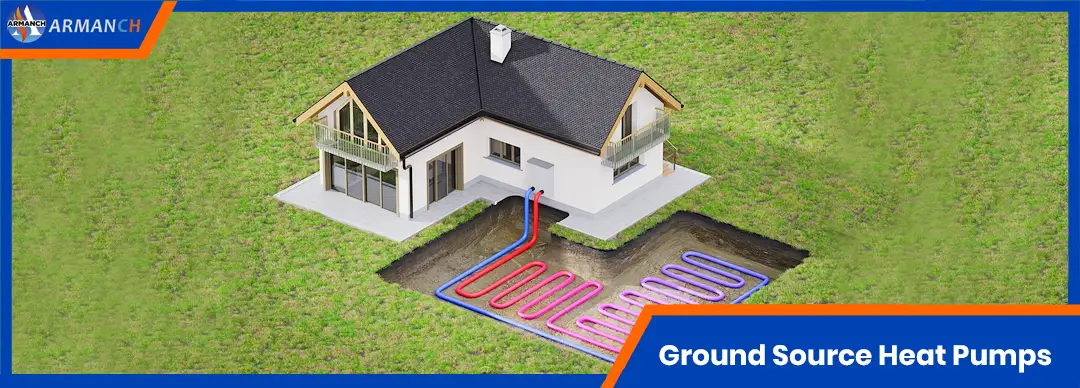Ground-Source Heat Pumps:
Are They Worth the Investment in Canada?
In recent years, the push towards sustainable and energy-efficient heating and cooling solutions has led many homeowners to consider ground-source heat pumps (GSHPs). But are these systems truly worth the investment, especially in the diverse climates of Canada and the United States? Let’s explore the benefits, costs, and long-term value of GSHPs to help you make an informed decision.
What Are Ground-Source Heat Pumps?
Ground-source heat pumps, also known as geothermal heat pumps, leverage the relatively stable temperatures below the Earth’s surface to heat and cool homes. Unlike air-source heat pumps, which extract heat from the air, GSHPs use a network of pipes buried in the ground to transfer heat. During the winter, the system extracts heat from the ground and pumps it into the home. In the summer, the process is reversed, and heat is extracted from the home and dissipated into the ground.

Benefits of Ground-Source Heat Pumps
1. Energy Efficiency: GSHPs are highly efficient because they use the constant temperature of the earth as a heat source. This can result in significant energy savings compared to traditional heating and cooling systems.
2. Environmental Impact: By using renewable geothermal energy, GSHPs reduce reliance on fossil fuels, leading to lower greenhouse gas emissions.
3. Long Lifespan: GSHPs have a longer lifespan than conventional heating and cooling systems. The underground components can last up to 50 years, while the indoor units typically last around 20 years.
4. Low Operating Costs: Due to their efficiency, GSHPs can lower your heating and cooling bills. While the initial installation cost is high, the long-term savings can be substantial.
5. Year-Round Comfort: GSHPs provide consistent heating and cooling, maintaining a comfortable indoor environment regardless of the season.
Suggested Article:
You might be interested in knowing more about: Heat Pump Installation Services
Costs and Considerations for Ground-Source Heat Pumps in 2024
When evaluating the costs and considerations for ground-source heat pumps, several factors come into play. The initial installation cost can be significantly higher than that of traditional heating systems due to the need for drilling and installing a ground loop. This complexity also means that specialized expertise is required, which can add to the upfront expenses.
Additionally, site suitability is a critical factor; not all locations are ideal for GSHP installations, and the specific geology and available land space must be assessed. However, these systems generally offer lower operating costs over time due to their high energy efficiency.
Maintenance requirements are typically lower than those of conventional systems, but regular checks are necessary to ensure optimal performance. In the context of Canada’s cold climate, the long-term energy savings and reduced environmental impact can make GSHPs a worthwhile investment despite the higher initial costs.
1. Initial Installation Cost: The upfront cost of installing a GSHP is significantly higher than that of traditional systems. This includes the cost of drilling or excavating to install the ground loop.
2. Installation Complexity: The installation of a GSHP is more complex and time-consuming, requiring specialized expertise.
3. Site Suitability: The feasibility of installing a GSHP depends on the geology of the site, available land space, and local regulations.
4. Maintenance: Although GSHPs generally require less maintenance than conventional systems, they do need periodic checks to ensure the system is operating efficiently.

Long-Term Investment Value of Ground-Source Heat Pumps in 2024
While the initial investment in a GSHP can be relatively high due to the costs associated with installation and specialized equipment, the long-term benefits and savings in energy costs, increased property value, and overall system efficiency often outweigh these initial expenses. Here’s why:
Firstly, energy savings are a significant advantage. GSHPs are known for their high efficiency, often operating at 300-600% efficiency, meaning they produce three to six times the energy they consume. This efficiency leads to substantial reductions in monthly utility bills, providing significant savings over the system’s lifespan.
Secondly, increased property value is another key benefit. Homes equipped with geothermal systems are often more attractive to potential buyers due to the promise of lower energy costs and environmental sustainability. This can result in a higher resale value compared to homes with conventional heating and cooling systems.
Thirdly, environmental benefits cannot be overstated. Ground-source heat pumps utilize renewable energy from the earth, significantly reducing reliance on fossil fuels. This reduces greenhouse gas emissions and contributes to a lower carbon footprint, aligning with global and local efforts to combat climate change.
Moreover, durability and longevity play a crucial role. The underground components of a GSHP can last up to 50 years, while the indoor components typically have a lifespan of about 20 years. This longevity means fewer replacements and lower long-term maintenance costs, contributing to overall savings.
In addition to these benefits, there are various incentives and rebates available. Many regions offer financial incentives, tax credits, and rebates for installing energy-efficient systems like GSHPs. These incentives can significantly reduce the upfront costs and improve the return on investment.
Finally, year-round comfort and reliability are essential. GSHPs provide consistent heating and cooling regardless of outdoor temperatures. They eliminate the need for separate heating and cooling systems, ensuring a comfortable indoor environment throughout the year. Their reliable performance, especially in extreme weather conditions, ensures peace of mind for homeowners.
Suggested Article:
You might be interested in to read more about: How do HVAC and water heaters interact?
Are GSHPs Worth the Investment in 2024?
Ultimately, whether a GSHP is worth the investment depends on your specific circumstances, including your financial situation, long-term plans, and commitment to sustainability. For many homeowners in Canada and the United States, the energy efficiency, environmental benefits, and long-term savings make GSHPs an attractive option.
However, it’s important to conduct a thorough assessment of your property and consult with professionals to ensure that a GSHP is the right choice for your home. With careful planning and consideration, a ground-source heat pump can be a smart and sustainable investment that pays off in the long run.






